Michael R. French's Blog, page 6
June 29, 2018
THE IMPORTANCE OF TIPPING
 Millennials have been described as stingy tippers, perhaps a cliché by now, yet I’ve seen first-hand young professional, pen in hand, look at the tipping line on the credit card receipt as an affront. I’ve seen a tab for $86 graced with a $2 gratuity, and one for over $100 with the words “no way” scribbled across the tipping line. “It’s like an extra tax,” I’ve heard diners say. My daughter once worked at a Washington DC taco and burger joint where almost a third of the customers left no tip. Whether parsimonious diners are reacting to bad food, bad service, are just cheap, think tipping is charity, or feel they have dropped enough coin for a meal and it’s the restaurants that should pay their servers a living wage….I have no idea. Maybe it’s all of the above, and more. I would love to see a consumer survey.
Millennials have been described as stingy tippers, perhaps a cliché by now, yet I’ve seen first-hand young professional, pen in hand, look at the tipping line on the credit card receipt as an affront. I’ve seen a tab for $86 graced with a $2 gratuity, and one for over $100 with the words “no way” scribbled across the tipping line. “It’s like an extra tax,” I’ve heard diners say. My daughter once worked at a Washington DC taco and burger joint where almost a third of the customers left no tip. Whether parsimonious diners are reacting to bad food, bad service, are just cheap, think tipping is charity, or feel they have dropped enough coin for a meal and it’s the restaurants that should pay their servers a living wage….I have no idea. Maybe it’s all of the above, and more. I would love to see a consumer survey.
Tipping allegedly started in 17thCentury English taverns, when patrons gave servers extra money ‘to insure promptitude” (TIP). The practice was later adopted in the States and other countries, but a fair number of cultures discourage the practice. Others add a gratuity automatically to the bill. Optional tipping is where a variety of emotions are aroused, not just from diners but servers and counter people. If using a digital device to indicate the amount of gratuity, I’ve watched the wait person turn away for a moment, giving the diner privacy in making his or her decision. To some, it feels rushed and awkward, but I’m not sure what can be done about it. Some waiters don’t even glance at tip amounts because it’s beyond their control, while others work diligently and hope to be rewarded. For many, the extra ten to twenty percent or more you add to your bill makes a difference in their standard of living, from affording an extra gallon of milk to paying the rent.
When I was younger and eating out was a luxury, I left a ten percent tip (parroting my parents), which was the standard at the time. As my wife and I grew financially secure, I raised the ante to fifteen or twenty. Now, witnessing the vast disparity in American incomes, and its consequences on the social fabric, I tip 25%. I can afford it and I know my server appreciates it. I find tipping not to be a tax but a bond between strangers. It’s a feel good moment, which there never seem to be enough of in the daily grind.
The other day I was introduced to a new word, Precariat. It blends “proletariat” and “precarious,’ and refers to a social class with little job security, resources, or means of escape to a better job. Sounds typical of today’s America, I thought ruefully. Anyone without bankable job skills, living paycheck to paycheck, whether it’s a waiter, bellhop, taxi driver or delivery person, knows the importance of a gratuity. I have a friend, whenever he eats out, who forgoes ordering an ice tea, or a dessert, and adds the difference to his tip. Small acts of grace and common sense ultimately change our thinking and maybe the world
Published on June 29, 2018 15:21
June 25, 2018
LEGACY OF PARKLAND SCHOOL SHOOTINGS
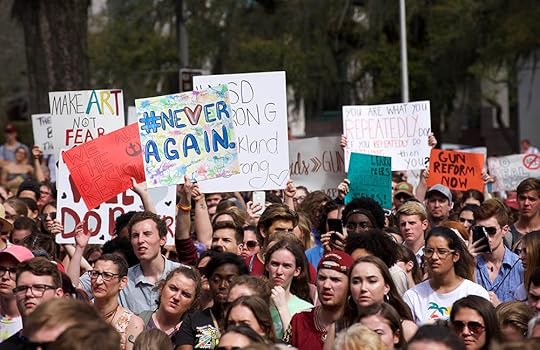 Orlando Weekly Photo by Monivette Cordeiro In a world where one news story, no matter how wrenching, risks being eclipsed quickly by another tragic event, the story of Parkland, Florida has stayed with me. Like, every day. It grabs my heart even more than Columbine, Sandy Hook, Virginia Tech, or dozens of other school killings. It’s hard emotionally to get beyond the slaughter of innocents, or the mental illness of their killers, but the survivors of Parkland found a collective voice to challenge a dark pattern of history, proclaiming “#Never Again.” They have an ambitious agenda now of lobbying legislatures, pursuing social media, and broadening their coalition. I’m rooting for them with every step.
Orlando Weekly Photo by Monivette Cordeiro In a world where one news story, no matter how wrenching, risks being eclipsed quickly by another tragic event, the story of Parkland, Florida has stayed with me. Like, every day. It grabs my heart even more than Columbine, Sandy Hook, Virginia Tech, or dozens of other school killings. It’s hard emotionally to get beyond the slaughter of innocents, or the mental illness of their killers, but the survivors of Parkland found a collective voice to challenge a dark pattern of history, proclaiming “#Never Again.” They have an ambitious agenda now of lobbying legislatures, pursuing social media, and broadening their coalition. I’m rooting for them with every step.
Down deep is another remarkable thing about Marjorie Stoneman Douglas High School. In the weeks following the tragedy, I listened to Cameron Kasky, Emma Gonzales, Alex Wind, David Hogg and other student leaders speak for sensible gun legislation and the responsibility of adults to protect minors. My take-away was maybe it’s high school students who need to protect and keep honest the adults. Their outspokenness was perhaps unprecedented coming from an American high school. Watching how poised, articulate and impactful a sixteen, seventeen or eighteen-year old could be, I was struck by their cohesiveness in rallying behind one of our century’s major issues: how to make us safer in an age of deepening insecurity, uncertainty and anxiety.
I have come to view students, in public and private high schools, as inescapably important members of society. For all the painful stories of kids marginalized by bullying and shaming, or who turn to drugs or guns or suicide to escape because they see no tunnel with a light, look again at Marjorie Stoneman High School. Students are proving there is a light to follow—speaking their convictions with dispassionate eloquence—and to move toward that light means self-esteem and self-empowerment. High schools across the country now have a precedent for being heard on crucial issues because a tired Congress, overworked media, churches, and political non-profits can’t get the job done alone. I hope more students give themselves permission to be taken seriously. They should insist on it, and ignore critics who view high school as a mere launch to college or adulthood.
I was in college in the golden age of President Kennedy’s dictum “don’t ask what your country can do for you, ask what you can do for your country.” Responding, my generation threw itself into the civil rights movement, the Peace Corp, local and national politics, and a search for a deeper identity for ourselves and our country. In the category of social activism. high schools might be the new colleges. As our political culture grows jarringly complicated, and I feel repression in the air, I long for the strength of new voices.
Published on June 25, 2018 16:21
June 21, 2018
THE MEANING OF ANTHONY BOURDAIN TO ME
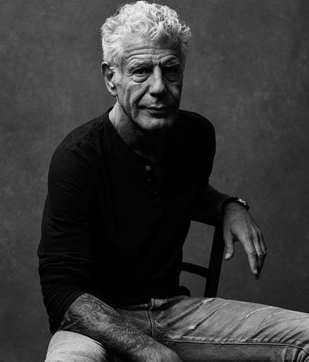 I’ve read several thoughtful pieces on the passing of Anthony Bourdain A sensitive, talented and self-doubting man complicated by addiction and depression, which he fought most of his life. As someone (and I don’t know how many other tens of millions) who deals with depression, I’d like to humbly add what life lessons Bourdain taught me.
I’ve read several thoughtful pieces on the passing of Anthony Bourdain A sensitive, talented and self-doubting man complicated by addiction and depression, which he fought most of his life. As someone (and I don’t know how many other tens of millions) who deals with depression, I’d like to humbly add what life lessons Bourdain taught me. On Parts Unknown, he sold his political views with sleight of hand. You thought you were watching an exotic food show, or a travelog filled with interesting people, but after being inundated with a season or two, you realized that Bourdain's view of food and cooking was more than about local color. His subtext was about what a culture can afford to eat, what it likes to eat, what it is conditioned to eat, and when, due to affluence, it craves something new and different. These are complex forms of self-expression and cultural identity, and defined mostly by economics or politics. If Bourdain had trained his critical eye on our country, he’d be asking why so many of us are gluttons for fast food, and even the idea of four, always inexpensive, high calorie meals a day? Or why do we go to Whole Foods and spend $150 when $100 would have bought a comparable basket at a more modest supermarket? Why do we pay $100 for a Chard loved by Beyonce? Why do we go on diets? Why do we go to gyms or yoga hoping for obedience from our bodies? Food drives us crazy. Perhaps there’s a hidden, even unconscious agenda behind what we put ourselves through. The pyramid of survival and happiness starts with food, education, and shelter, but then the simple plan gets blown out by status seeking, greed, fear, ambition, novelty and the political views to justify what we’ve become.
Until his mid-forties, Bourdain knew from life as an addict, suffering from depression, that each day was as precious as it was precarious. Then, almost overnight, he caught a break by writing Kitchen Confidentialand going to culinary school. Ultimately, he became a star in the celebrity firmament. Terra Incognito for our hero. He happily forgot the lessons of being broke and on the street, I believe, because he thought he had escaped them. Instead of heroin, he became addicted to his success, and understandably so. Millions of us loved watching him and hearing what he had to say. I think he likely attributed his self doubt, which always returned unexpectedly, to a former life of steep vulnerability, thinking that it no longer mattered. Of course it mattered, and down deep he had to know that, but he couldn’t let go of a lifestyle that was the envy of so many people. He looked at low self-esteem as the enemy, instead of what it is—the canary in the coal-mine, warning of serious danger ahead. One bad night filled with unimaginably wretched feelings may amount to nothing in the morning, but one time it just might be enough to want to close your eyes for good. That’s my real takeaway from an extraordinary, troubled American life. Pay attention to your thoughts and feelings, because few others will care as much as you should. Your worst moments should be your wake up call. That is not boastful piety. I think Bourdain, had he survived the hours before his death, might have had some moments of clarity where he got real with himself.
Published on June 21, 2018 15:50
August 27, 2017
Making your Characters Authentic - Part 7
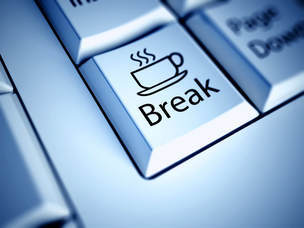 All good writing, whether its plot, theme or characters, involves a high degree of problem solving. You start your novel after doing the prep work described above, yet as the words march across the page, something feels a little off. You can’t put your finger on it. What have you forgotten or overlooked? Where is the spontaneity and energy? The pieces fit beautifully when your first imagined them, but suddenly they’re like reading a foreign language. Take a break. Do something else with your life that week, or work on a different part or aspect of the novel. Ultimately, the biggest problem, when you finally solve it, can becomes your best writing.
All good writing, whether its plot, theme or characters, involves a high degree of problem solving. You start your novel after doing the prep work described above, yet as the words march across the page, something feels a little off. You can’t put your finger on it. What have you forgotten or overlooked? Where is the spontaneity and energy? The pieces fit beautifully when your first imagined them, but suddenly they’re like reading a foreign language. Take a break. Do something else with your life that week, or work on a different part or aspect of the novel. Ultimately, the biggest problem, when you finally solve it, can becomes your best writing.
Published on August 27, 2017 13:37
Making your Characters Authentic - Part 6
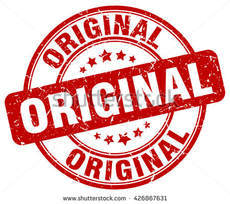 Try to have one of your characters do or say something in the course of the narrative that’s totally original…something that’s never been done in another movie or film. This is not easy to achieve, but if you have an imagination, have some fun with it. You’ll go down a lot of dead ends, but if you’re lucky, you’ll end up on a mountain peak. Remember that the event has to be plausible, but originality is usually memorable. No matter how many crime stories we read, for example, the great ones take our thoughts and emotions to unexplored places. It’s what readers talk about in reviews and blogs.
Try to have one of your characters do or say something in the course of the narrative that’s totally original…something that’s never been done in another movie or film. This is not easy to achieve, but if you have an imagination, have some fun with it. You’ll go down a lot of dead ends, but if you’re lucky, you’ll end up on a mountain peak. Remember that the event has to be plausible, but originality is usually memorable. No matter how many crime stories we read, for example, the great ones take our thoughts and emotions to unexplored places. It’s what readers talk about in reviews and blogs.
Published on August 27, 2017 12:37
August 18, 2017
Making your Characters Authentic - Part 5
 Building a character arc should be done over the span of the novel. Just like it’s a writing sin to have an information plot dump in the first chapter of your book, likewise your characters shouldn’t reveal themselves right away. One aspect at a time—brought out by action rather than exposition—keeps the reader engaged.
Building a character arc should be done over the span of the novel. Just like it’s a writing sin to have an information plot dump in the first chapter of your book, likewise your characters shouldn’t reveal themselves right away. One aspect at a time—brought out by action rather than exposition—keeps the reader engaged.
Published on August 18, 2017 16:39
July 31, 2017
Making your Characters Authentic - Part 4
 Most writers are more comfortable delineating one sex (or gender) over another, which often dictates their main characters and the genre a writer chooses. You can still be a male and write fantasy romances, or a female skilled at describing war scenes, but whatever your strength, play to it.
Most writers are more comfortable delineating one sex (or gender) over another, which often dictates their main characters and the genre a writer chooses. You can still be a male and write fantasy romances, or a female skilled at describing war scenes, but whatever your strength, play to it. Very few writers do everything well. The best write about what they know, and their characters evoke passion, empathy or curiosity in a reader.
Published on July 31, 2017 12:24
July 17, 2017
Making Your Characters Authentic - Part 3
 It’s great to surprise a reader with the unexpected, helping give a twist to the plot and the character, but whatever transpires, it must have credibility. Unless she’s a prodigy, a twelve year old girl is not going to solve the murder of her parents that happened ten years earlier. A surgeon who graduated from Harvard is not likely to leave a sponge behind in his patient’s abdomen. If you go for low probability events, or extreme twists, you have to back them up with plausible explanations. The “willing suspension of disbelief” only goes so far. Once a reader becomes skeptical that the writer doesn’t know what he or she is talking about, it’s tough to win them back.
It’s great to surprise a reader with the unexpected, helping give a twist to the plot and the character, but whatever transpires, it must have credibility. Unless she’s a prodigy, a twelve year old girl is not going to solve the murder of her parents that happened ten years earlier. A surgeon who graduated from Harvard is not likely to leave a sponge behind in his patient’s abdomen. If you go for low probability events, or extreme twists, you have to back them up with plausible explanations. The “willing suspension of disbelief” only goes so far. Once a reader becomes skeptical that the writer doesn’t know what he or she is talking about, it’s tough to win them back.
Published on July 17, 2017 20:02
July 7, 2017
Making Your Characters Authentic - Part 2
 Great characters, to enhance their arc, should have a fourth or fifth gear that seems to come out of nowhere. For example, villains can turn into heroes with an act of kindness that we would never have anticipated, yet when we read the novel closely, we realize that the seed of kindness was planted by the writer from the beginning. Similarly, characters we start off admiring suddenly disappoint us when they hurt someone they love. If they don’t realize what they’ve done, figuring out the “why” makes them even more interesting. Well-conceived characters can help with plot troubles, too, if the writer wakes one morning and isn’t sure where his or her story is going (happens to most of us). Instead of robbing a bank, for example, your destitute character decides to give away his last fifty dollars to a stranger. The wife who has been cheated on, instead of taking revenge on her husband, is filled with insights about her father. A deeply-felt, richly-imagined character is your writing buddy, your co-conspirator, and their importance to the final product can’t be overstated.
Great characters, to enhance their arc, should have a fourth or fifth gear that seems to come out of nowhere. For example, villains can turn into heroes with an act of kindness that we would never have anticipated, yet when we read the novel closely, we realize that the seed of kindness was planted by the writer from the beginning. Similarly, characters we start off admiring suddenly disappoint us when they hurt someone they love. If they don’t realize what they’ve done, figuring out the “why” makes them even more interesting. Well-conceived characters can help with plot troubles, too, if the writer wakes one morning and isn’t sure where his or her story is going (happens to most of us). Instead of robbing a bank, for example, your destitute character decides to give away his last fifty dollars to a stranger. The wife who has been cheated on, instead of taking revenge on her husband, is filled with insights about her father. A deeply-felt, richly-imagined character is your writing buddy, your co-conspirator, and their importance to the final product can’t be overstated.
Published on July 07, 2017 13:52
July 3, 2017
Making Your Characters Authentic - Part 1
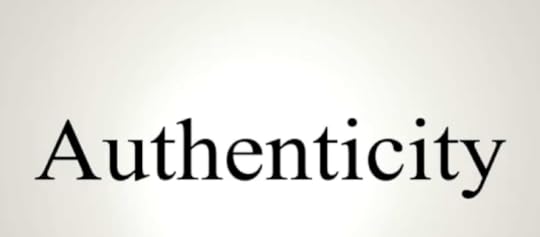 There may be a thousand and one books on how to write a novel, filled with sound observations, but when it comes to creating and developing characters, many emphasize the mechanical over the intuitive. Over decades, here’s what I’ve painstakingly learned about making your characters authentic, original and memorable.
There may be a thousand and one books on how to write a novel, filled with sound observations, but when it comes to creating and developing characters, many emphasize the mechanical over the intuitive. Over decades, here’s what I’ve painstakingly learned about making your characters authentic, original and memorable.Stay tuned for the next post!
Most writers begin the writing process by working on plot. While plot is obviously important, I also like to know everything possible about my main characters, even if I never use many of their details in the novels. Whether you take voluminous notes about them, or talk out loud to them (and they talk back to you), it’s rarely enough. You need to imagine what they would do off the page, i.e., if they had to attend your Uncle George’s July fourth barbecue, or somehow landed in another novel altogether. Make them your best friends or worst enemies. Whether they come from your imagination or real life (or a combination thereof), you should be inside your characters a few hours every day—before you write a single word. Think of method acting. Characters aren’t simply pawns in a plot—they transcend it. They are what you remember long after the plot is often forgotten.
Published on July 03, 2017 13:50



